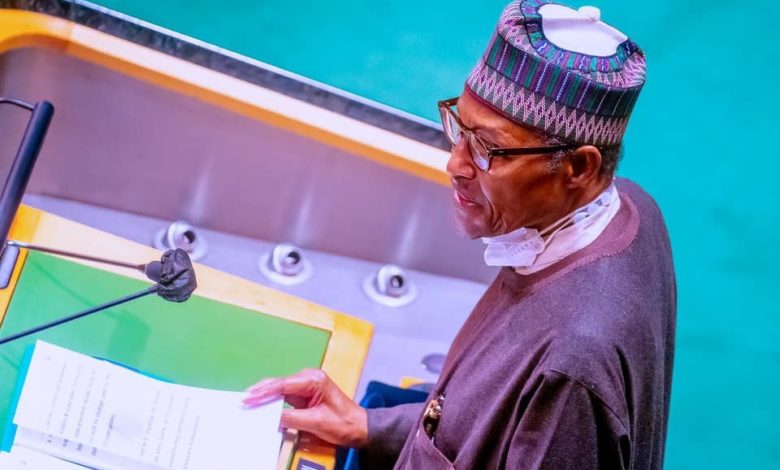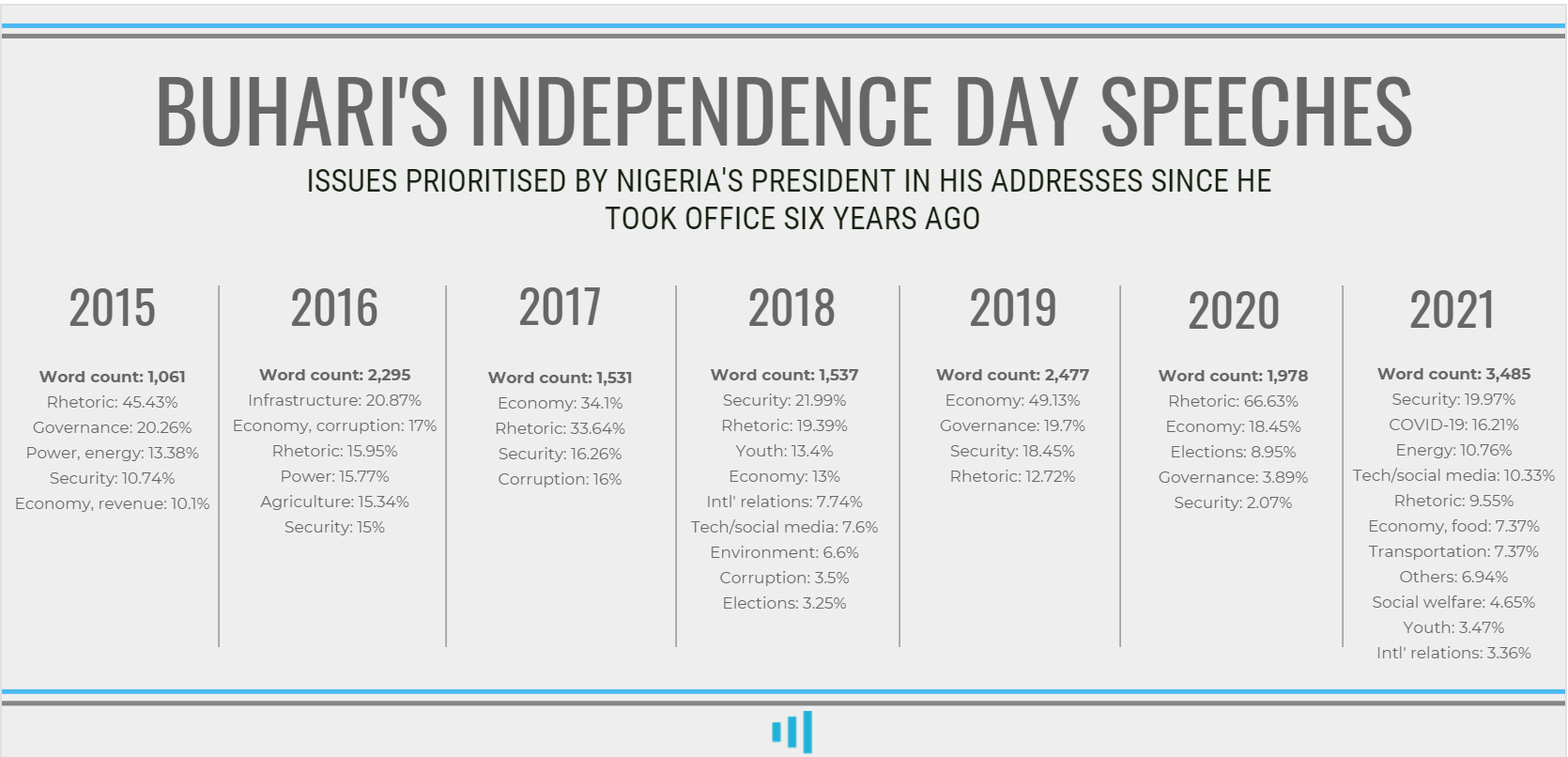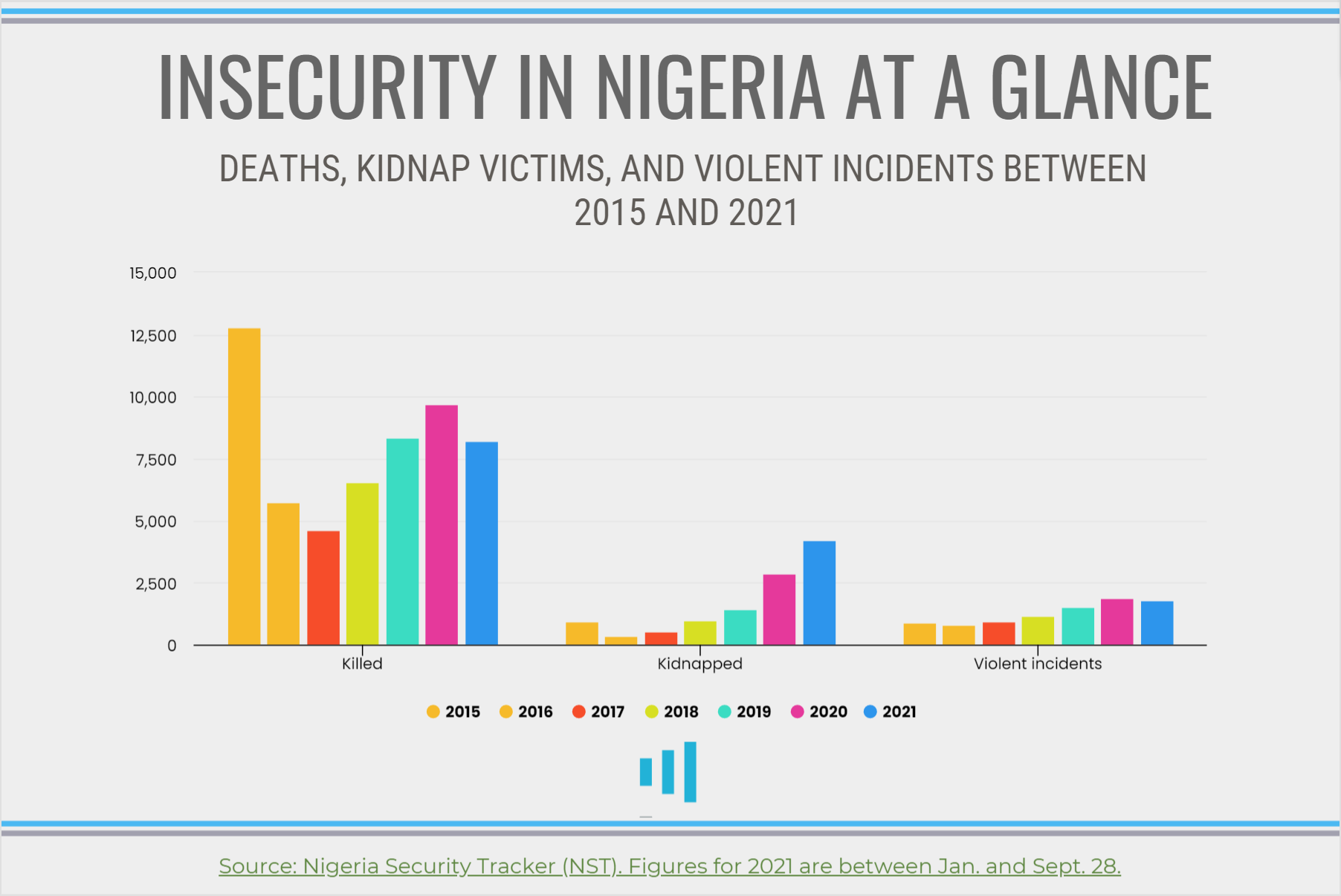Data: How Buhari’s Oct. 1 Speeches Reflect Nigeria’s Growing Insecurity
Statistical analysis of Muhammadu Buhari’s Independence Day speeches since 2015 gives an insight into how his administration perceives and prioritises worsening security challenges.

Ever since Nigerian first and only Prime Minister, Abubakar Tafawa Balewa, delivered a speech to mark Nigeria’s independence on Oct. 1, 1960, the day has presented an annual opportunity for the country’s leaders to commit to good governance and give accounts of stewardship.
Under current President Muhammadu Buhari, one issue has featured prominently in the Independence Day addresses since he took office in 2015: insecurity.
HumAngle examined the seven Oct. 1 speeches so far delivered by Nigeria’s incumbent leader and segmented them, based on word count, into different topics, including insecurity, economy, government, power/electricity, energy, environment, health, works and infrastructure, and so on.
The introductory and concluding paragraphs and other parts that were not addressing specific issues were categorised as “rhetoric.”
What is glaring is that the rising cases of armed violence, crime, and terrorism across the country are impossible to ignore and have progressively occupied a dominant space in the presidential speeches.
10.7%: Security dominates 2015 speech
Months into his swearing-in in 2015, 10.7 per cent of the Independence Day address was dedicated to addressing the issue of insecurity. The notorious terror group, Boko Haram, had intensified its campaign in the previous year, capturing over 20 local government areas in Adamawa, Borno, and Yobe states. Some of them were recovered a few months before the start of Buhari’s administration. So, naturally, he spoke about his attempts to strengthen partnerships with the Lake Chad countries and world powers “to build an international coalition against Boko Haram.”
“Our gallant armed forces under new leadership have taken the battle to the insurgents, and severely weakened their logistical and infrastructural capabilities. Boko Haram are being scattered and are on the run,” he claimed.
Nearly half of the speech (45.4 per cent) was rhetoric and the next biggest chunks revolved around governance, power, economy, and revenue generation.
15% in 2016
In 2016, the portion of the speech focusing on insecurity grew to 15 per cent. But it still was not the most prominent topic. Works and infrastructure occupied a bigger part (20.9 per cent) of the speech, followed by economy and corruption (17 per cent), power (15.8 per cent), and agriculture (15.3 per cent). The rest of the speech dwelled on rhetoric and words of inspiration.
Buhari said that his government had recorded progress when it came to security. “Boko Haram was defeated by last December – only resorting to cowardly attacks on soft targets, killing innocent men, women and children,” he said, echoing his statement the previous year.
But other forms of violence had started to draw attention and lead to the loss of lives and property.
“Besides Boko Haram, we are confronting other long-running security issues, namely herdsmen vs farmers, cattle rustling, kidnappings,” Buhari acknowledged. “A new insurgency has reared up its head in the shape of blowing up gas and oil pipelines by groups of Niger Delta Militants.”
Security takes more space in 2017
The 2017 speech was even more heavily about insecurity with 16.3 per cent of it addressing trending issues in the area. Other issues mentioned in the relatively short speech included economy and corruption.
Again, President Buhari maintained that the government had defeated Boko Haram and that the terror group’s “cowardly attacks” only targeted vulnerable places. “Government will continue to support the Armed Forces and other security agencies to fight not only terrorism, but kidnapping, armed robberies, herdsmen/farmers violence and to ensure peace, stability and security in our country,” he added.
The country had started to witness a spike in the rate of abductions. While there were 825 victims documented by the Nigeria Security Tracker (NST) the previous year, kidnappees in 2017 numbered at least 948. The problem would only worsen subsequently with the number of victims doubling two years later.
And even more in 2018
Meanwhile, over a fifth (22 per cent) of the Independence Day speech in 2018 was about insecurity, thus drowning an array of other issues such as economy, international relations, climate change, technology, corruption, youth development, and election.
“There has been a steady improvement in the security situation in the Northeast,” Buhari claimed, while promising to investigate complaints related to the welfare and entitlements of security personnel.

It shrinks insignificantly in 2019 and then plummets
In 2019, however, the percentage of the speech related to security dropped slightly to 18.5 per cent, and then it dropped further in 2020 to a meagre 2.1 per cent, despite significant increases in violent events and fatalities.
The addresses were rather focused on economy, corruption, governance, and elections. As much as 66.6 per cent of the 2020 speech was full of rhetoric though it was a year when Nigerians were threatened by both increased violent attacks and health hazards.
Security takes 20% of 2021 speech
In his latest speech delivered on Friday, Buhari again dwelled heavily on insecurity with nearly 20 per cent of it being about the safety of lives and property. The speech features the word ‘banditry’ for the first time too and condemns separatist agitations in the southern region.
“As our economy continues to open after the COVID-19 related lockdowns, we have also seen the resurgence of insecurity in certain parts of the country,” he stated.
The number of times the words ‘insecurity’ and ‘security’ were used in the seven speeches have increased from one in 2015, five in 2016, and six in 2017 to 13 this year.
Though Nigeria’s president recently claimed there has been “tremendous progress” in addressing security challenges, statistics available point in the opposite direction.
Analysis of data collected by the NST shows a progression in the number of people killed and kidnapped between 2015 and 2021. While the number of deaths dropped between 2015 and 2017, they have since picked up again.

“Political pressure is mounting on President Buhari as his government claims it is doing its best and succeeding,” observed senior analyst at the Tony Blair Institute for Global Change, Bulama Bukarti, in April. “But the reality does not show it.”
Support Our Journalism
There are millions of ordinary people affected by conflict in Africa whose stories are missing in the mainstream media. HumAngle is determined to tell those challenging and under-reported stories, hoping that the people impacted by these conflicts will find the safety and security they deserve.
To ensure that we continue to provide public service coverage, we have a small favour to ask you. We want you to be part of our journalistic endeavour by contributing a token to us.
Your donation will further promote a robust, free, and independent media.
Donate HereStay Closer To The Stories That Matter




